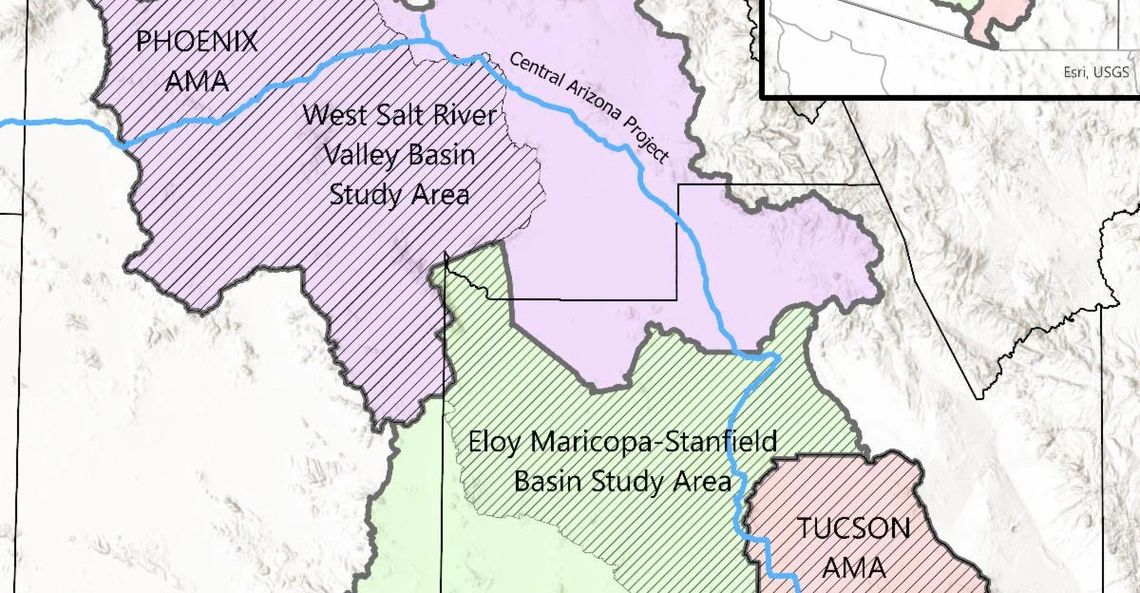Reclamation Article Series, Part 4: Arizona Basin Studies - Commonalities
Jan. 8, 2021
Image

 The following is the final installment of a four-part article series from our valued colleagues at the US Bureau of Reclamation (Reclamation). The series covers the three Basin Studies currently underway in Arizona. John Rasmussen, Eve Halper, and Valerie Swick, Water Resource Planners at Reclamation, authored the series.
The following is the final installment of a four-part article series from our valued colleagues at the US Bureau of Reclamation (Reclamation). The series covers the three Basin Studies currently underway in Arizona. John Rasmussen, Eve Halper, and Valerie Swick, Water Resource Planners at Reclamation, authored the series.
Over the past three issues of the Weekly Wave, an article on each of Arizona’s three WaterSMART (Sustain and Manage America’s Resources for Tomorrow) Basin Studies (Basin Studies) was presented. The three Basin Studies are the West Salt River Valley, the Lower Santa Cruz River, and the Eloy and Maricopa-Stanfield. While each of these studies is at different stages in their analyses, they all have the same end goal: developing strategies to adapt to a changing water future. A common aspect of that future is the likelihood of less water in the Lower Colorado River system as a result of drought. These changes take place within a complicated context of water law and regulations, variable local climates, prolonged drought, and dynamic demand patterns.
Fortunately, the Basin Studies have access to a tool developed by the Central Arizona Project (CAP) called the CAP:Service Area Model (CAP:SAM), which takes into account the complex regulatory landscape faced by water providers within Arizona’s Active Management Areas. CAP:SAM uses sets of assumptions that include rates of population and economic growth to estimate future municipal, industrial, and agricultural demands by water provider. The model also simulates how water providers may substitute water supplies to meet demand when their preferred source of supply is not available.
CAP:SAM is being used to estimate future water demand for all three Basin Studies. Reclamation modeling complements the CAP:SAM projections by translating water provider demands into site-specific models of groundwater pumping and recharge. Groundwater model output shows the locations where groundwater levels may change, allowing for an evaluation of risks to water infrastructure and other resources. These results also form the basis for developing and screening adaptation strategies.
Each Basin Study relies upon collaboration and cooperation among its stakeholders to characterize the issues and adaptation approaches unique to each basin. The West Salt River Valley Basin Study focuses on the tremendous growth of Phoenix’s West Valley and the need for safe and reliable water. The Lower Santa Cruz River Basin Study is concerned with changes to the local climate, within-basin supply-demand imbalances, and impacts to the environment, especially riparian areas. The Eloy and Maricopa-Stanfield Basin Study tries to balance agriculture, the basin’s number one industry, with population and economic growth.
Each Basin Study will result in an increased knowledge base, development of planning tools, and a set of strategies to inform and prioritize future actions. Reclamation intends to remain involved in the basins after the studies are complete and will promote post-study opportunities to benefit stakeholders. For instance, entities that have completed a Basin Study may apply for Reclamation’s Water Management Options Pilot Program to build on analyses and strategies developed in the Basin Study. For more information about this and other WaterSMART programs, go to https://www.usbr.gov/watersmart/index.html.

